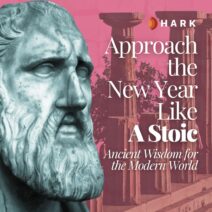What Is Arete? Why Excellence, Not Success, Defines a Good Life

In Stoicism, arete (Greek: ἀρετή) is one of the most important central concepts to know. Often translated as virtue or excellence, it describes the highest good in Stoic philosophy: living in full alignment with reason, nature, and moral integrity.
But why should a modern reader care about an ancient Greek word?
The Stoics believed that arete is the only thing truly in our control and the only source of true fulfillment. In a world full of distractions and performance metrics, returning to this simple concept can radically shift how we live, work, and relate to others.
Breaking Down the Word: What Does Arete Mean?
The word arete (ἀρετή) comes from ancient Greek and literally means “excellence” or “virtue.” It originally referred to excellence in any field: an athlete, a craftsman, or a leader could all display arete.
But for the Stoics, arete wasn’t about winning races or mastering a craft. It meant moral excellence — the inner quality of being the best version of yourself by living according to reason and nature.
As Epictetus put it:
“The educated alone are free.”
Epictetus, The Discourses, Book 2, Chapter 1.22
Education, in Stoicism, meant cultivating excellence: developing your rational faculties, acting justly, and living with integrity regardless of circumstances.
The Key Dimensions of Arete in Stoicism
Arete can be understood through several interrelated aspects:
- Moral Character: A commitment to do what is right, regardless of the outcome.
- Self-Mastery: Choosing reason over impulse, order over chaos.
- Practical Wisdom: Knowing how to act rightly in any given situation.
- Purposeful Living: Striving to fulfill your nature as a rational, social being.
Virtue isn’t a trait you possess once and for all. It’s an ongoing commitment to choose virtue in every situation, big or small.
Arete and Other Core Stoic Principles
Arete is not an isolated idea in Stoicism. It’s deeply connected to other foundational concepts:
- Virtue (arete) is the only good in Stoicism. Everything else is indifferent.
- Reason (logos) is our guiding faculty. Living according to reason is how we express arete.
- Nature (physis) defines our role. Acting in harmony with nature is the path to virtue.
- Wisdom (sophia) is the chief of the four cardinal virtues and the foundation of arete.
- Community (koinonia) reminds us that excellence includes how we serve others, not just ourselves.
Arete vs. Common Misunderstandings
In modern usage, “virtue” might sound outdated or moralistic. And “excellence” can sound like career success or perfectionism.
But Stoic arete is not about social status, religious purity, or flawlessness.
It’s about choosing the best action available to you in alignment with reason and justice, regardless of praise or reward.
It is internally defined and always available to you, even in hardship.
Why Arete Is Central to Stoicism
Marcus Aurelius reminds us:
“If you find anything better than that, embrace it without reservations, it must be an extraordinary thing indeed, and enjoy it to the full.”
Marcus Aurelius, Meditations, Book 3.6
For the Stoics, nothing is better than virtue. It is the only good that cannot be taken from you.
This is why Stoic ethics rest entirely on developing arete. It’s the goal of all practice, reflection, and training. Without arete, no other Stoic idea truly matters.
How to Practice Arete: 4 Stoic Exercises
- Daily Reflection: Ask yourself each evening, “Where did I act with excellence today? Where did I fall short?”
- Role Reminder: Choose a role you value (e.g., friend, leader, parent) and ask, “What does excellence look like in this role today?”
- Virtue Over Outcome: Before a challenge, say, “My goal is to act with courage and integrity, regardless of the result.”
- Pre-Meditation: Visualize a difficult situation and rehearse how you will respond with reason and virtue.
Practicing arete is not abstract. It shows up in how you speak, respond, decide, and live — one choice at a time.
Frequently Asked Questions
What does arete mean in Stoicism?
Arete means moral excellence or virtue. It is the highest good in Stoic philosophy and the key to a flourishing life.
Is arete the same as modern success or achievement?
No. Arete is internal, ethical excellence, not external success. It depends only on your choices and intentions.
Can anyone develop arete?
Yes. The Stoics believed every rational being has the capacity to live with arete through practice and reflection.
Conclusion: Choose Excellence, Not Perfection
Arete calls you to live your highest self in each moment, not to be perfect but to be principled.
In a noisy world full of shifting standards, Stoic excellence is quiet, steady, and self-sufficient. It doesn’t wait for approval. It begins with intention.
The road to excellence starts today
Today, choose one role you play in life, as a partner, a colleague, a friend, and ask: “What would excellence look like right now?” Then, act on it.
Want to Learn more?
If this concept resonates, explore other key Stoic terms in our Stoic philosophy Terms glossary. If you are looking for some more personal guidance, book a free consultation with one of our Stoic coaches to see how we can help you. You can also listen to the Via Stoica podcast on Spotify or Apple Podcasts, or watch us on YouTube.
Author Bio
Benny Voncken is the co-founder of Via Stoica, where he helps people apply Stoic philosophy to modern life. He is a Stoic coach, writer, and podcast host of The Via Stoica Podcast. With almost a decade of teaching experience and daily Stoic practice, Benny creates resources, workshops, and reflections that make ancient wisdom practical today.
Related Posts
-
 Greek Stoic Philosophy Terms
Greek Stoic Philosophy TermsWhat Is Ekklisis? The Stoic Art of Avoiding What Harms Your Character
What Is Ekklisis? Ekklisis in Stoicism is the rational refusal to engage with what would damage one’s moral choice. The Stoic meaning of ekklisis is important because it teaches us what to turn away from, not out of fear, but out of commitment to living well. In daily life, ekklisis helps us step back from […]
Read more -
 Via Stoica Podcast
Via Stoica PodcastA Hark Audio Curated Stoic Playlist for 2026
At the start of a new year, there is often an unspoken promise that things will somehow be different. Calmer. More ordered. More predictable. Yet life rarely follows that script. Delays disrupt flights, plans break down, people drift away, and life brings events we cannot control. What we can work on, and what Stoicism has […]
Read more -
 Book Reviews
Book ReviewsThe Stoic Leader by John Sellars and Justin Stead
The Stoic Leader introduces Stoicism as a practical philosophy and explores how its principles shape leadership, judgment, and character in both work and life. Summary Written by John Sellars and Justin Stead, The Stoic Leader offers what is effectively two books in one. Sellars provides an introduction to Stoicism and its philosophical foundations, while Stead […]
Read more


Comments 0